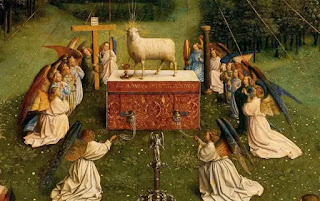'An old Calvinistic formula': the sacramental Calvinism of Lancelot Andrewes

How are we to understand the eucharistic theology of Lancelot Andrewes? Since the mid-19th century, the Tractarian suggestion that Andrewes represented a rejection of Reformed sacramental theology has become almost de rigueur within Anglicanism. This being so, the words of Andrewes - here in response to Cardinal Bellarmine - are therefore presented as an alternative to both Reformed and Tridentine eucharistic theologies: For, what the Cardinal is not, unless willingly, ignorant of, Christ said, This is My Body: not, in this mode, This is My Body. Now, we are agreed with you about the object; all the contention is about the mode: concerning This is, we with firm faith hold that it is [the Body of Christ]; concerning In this mode it is, (namely, by the bread being transubstantiated into His Body,) concerning the mode by which it is made to be, whether by in, or con, or sub, or trans, there is not a word there ... In The Teaching of the Anglican Divines in the Time of King James I and Ki...










